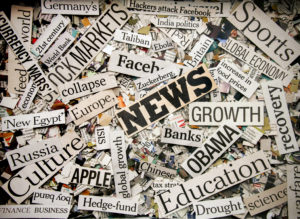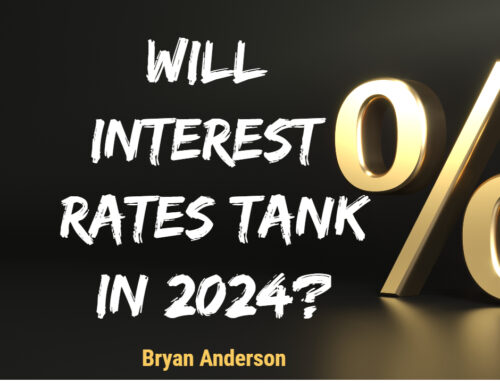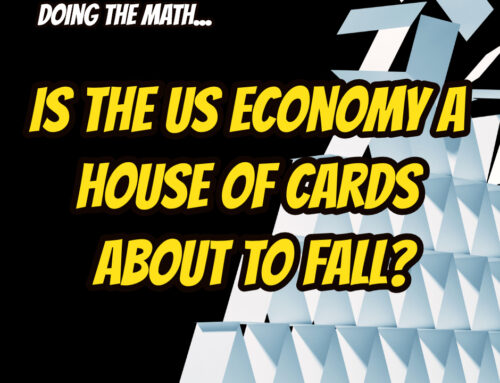“Life unwinds like a cheap sweater, but since I gave up hope I feel a lot better. The truth gets blurred like a wet letter, but since I gave up hope I feel a lot better.” –Singer-songwriter Steve Taylor.
By Eric Coons
Ever feel like you’re dog-paddling upstream in a river of fools? Or that you’re the only sane resident of the Crazy Farm? If you’re like me, you’ve long given up on getting anything vaguely resembling the truth from the nightly news. The official narratives churned out by spokespeople, bankers, politicians, and corporate toadies reek of self-serving Newspeak. Almost nothing dished out passes the sniff test. Or, perhaps it does, but it probably smells like a stockyard after a long day in the sun.
Isn’t it time to wake up and ditch the “hopium?”
All the spin-doctoring in the world by lazy journalists and petty bureaucrats can’t kill the sewage-y aroma of reality. That smell tips us off that something is very, very wrong in our world.
So, how will you possibly survive the insanity and thrive when others all around you are going nuts? You can start by giving up the artificial hope being spoon-fed to you by pundits, politicians, and purported journalists. When you give up that faux hope, you will eventually feel much better and be more prepared for what lies ahead.
The key to replacing false hope with actionable strategies lies in diversifying your finances and the rest of your life. Diversification spreads your risks around so that the slings and arrows don’t turn into direct hits that sink your boat. When your parents warned you not to put all your eggs in one basket, they were urging you to diversify.
You can do a few things to become more agile, resilient, and risk-resistant as the economy sputters and humans go berserk.

Diversify your thoughts. Although you’ve heard that it’s a tragedy to waste a mind, something else may be an even greater waste. That tragedy occurs when your mind becomes landlocked, and your worldview is so myopic that you miss what’s happening around you.
Diversity of thought means you accept that there is more than one way of thinking about a piece of information. Everyone interprets information and interacts with the world differently. By recognizing your unique identity, personal experiences, and background, you will approach problems differently. Fostering cognitive diversity means that instead of going along with the status quo or looking to someone else to solve your issues, you will be able to think for yourself and create new ideas.
You can have more cognitive diversity by:
- Realizing you have unconscious biases (all of us do) and working on removing them. This is a challenging task, I admit. And you will never be able to erase all your subconscious biases. However, confronting those biases will inevitably lead to a more balanced, fair thought process and make interacting with others more productive and pleasant.
- Replacing “groupthink” with brainstorming. Brainstorming with friends, family members, or colleagues will help you test-drive your existing ideas and create new ones.
- Reading books about subjects you don’t like or understand. Why would you read a book on sailing if you’re desperately afraid of the ocean? Or listen to an audiobook about preparing legal documents when that kind of stuff bores you to tears? It’s simple. Your brain gets more efficient, and its “neuroplasticity” increases when you expose it to new concepts and experiences. According to scientists, neuroplasticity is the brain’s uncanny ability to reorganize its pathways and build more connections. Your brain physically changes every time you feed it new information. Neuroplasticity, as you might imagine, can be enhanced by starting new hobbies, listening to different music, traveling, or learning another language, among other things.
Diversify your news input.

Step over the stinking cow patty known as network news. It doesn’t matter whether you’re watching FOX, PBS, CNN, CNBC, CBS, or ABC; network news is designed to depress, distract, and disinform. It’s 30-60 minutes of brain-rotting, superficial fear-mongering. While it’s true that you should know the essence of what’s happening around you to avoid being blindsided, blogs and online publications do a much better job of reporting current events. There are also excellent news and analysis podcasts available. The best of these broadcasts will be those that don’t push any one agenda, allow the free expression of opinions and aren’t afraid of controversial topics and guests. Listen to a few and pick out some that resonate with you.
Diversify your personal economy
Most people would never dream of putting all their wealth into a single investment. Yet, many of those same folks put their economic futures in the hands of a single company. This is usually not a wise idea.
Even the most “recession-proof” blue chip companies have started laying off employees or implementing hiring freezes and other cutbacks. You put yourself on shaky ground if you depend on a single job to meet all your financial needs.
Author Hemant Taneja (Unscaled) believes that full-time jobs will soon be obsolete. Taneja maintains that living an entrepreneurial life is the only sure way forward after an economic collapse. He envisions a future where work is a mix of long and short-term contracts, gigs, side hustles, and entrepreneur-imagined products and services developed in conjunction with automation and artificial intelligence. Taneja advises people to diversify their economies by finding things they are truly good at and want to do and marketing them to anyone and everyone.
In today’s world, many of us are a single corrupt CEO, misguided boardroom decision, or supply chain hiccup away from unemployment. If you are a career-oriented person, pivoting to the entrepreneurial lifestyle will surely be a bit intimidating and require a complete shift in your mindset. However, this shift could be your opportunity to explore more meaningful work that can provide more balance and personal growth.
By incorporating entrepreneurship as an integral part of your life, you’ve created income streams to replace those that have run dry, and you have more peace of mind knowing you are as self-reliant as possible.
Eric’s Takeaways: There are dozens of ways to diversify your life, mind, and livelihood. As the economy grows wobbly and society has a collective nervous breakdown, becoming more entrepreneurial and adaptable is key to moving beyond the chaos. Please get in touch with me to discover more about how I help entrepreneurs break from toxic money paradigms and create better realities.





